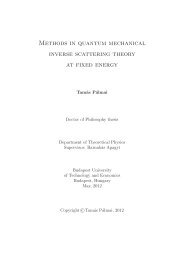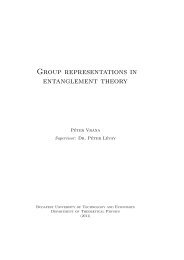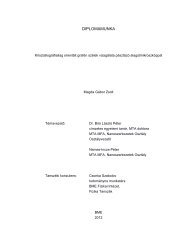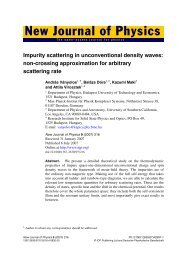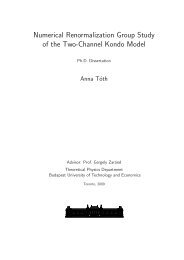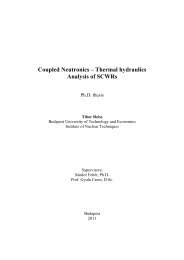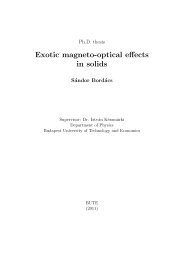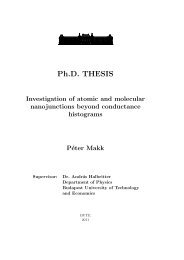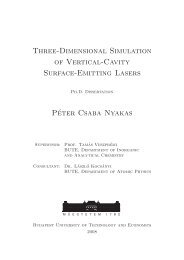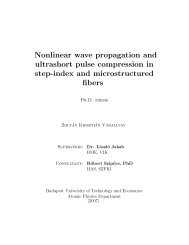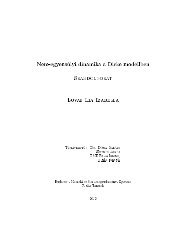Ph.D. THESIS Multipolar ordering in f-electron systems
Ph.D. THESIS Multipolar ordering in f-electron systems
Ph.D. THESIS Multipolar ordering in f-electron systems
You also want an ePaper? Increase the reach of your titles
YUMPU automatically turns print PDFs into web optimized ePapers that Google loves.
Chapter 2 Overview of the Theoretical Background 21<br />
between the magnetic moments, they cannot couple to the lattice displacements<br />
due to the time reversal <strong>in</strong>variance. A consequence of the coupl<strong>in</strong>g<br />
of the electric multipoles to the lattice is the Jahn-Teller theorem. It states<br />
that if the ground state is orbitally degenerate due to the relatively high symmetry<br />
of the crystal field, then it is energetically preferable for the lattice<br />
to distort <strong>in</strong> such a way that the orbital degeneracy is lifted. If the lattice<br />
distortion happens <strong>in</strong> the same direction, it may lead to ferro-type orbital<br />
<strong>order<strong>in</strong>g</strong>, while alternat<strong>in</strong>g distortion leads to antiferro-type <strong>order<strong>in</strong>g</strong>.<br />
2.5 <strong>Ph</strong>ase Transitions<br />
At high temperatures, the <strong>electron</strong>ic system possesses the full symmetry<br />
of the lattice. In general, decreas<strong>in</strong>g the temperature, one of the Fourier<br />
components χ q of the susceptibility χ = ∂ 2 F/∂µ 2 i , where µ i are the fields<br />
conjugated to the different order parameters, will diverge at T c <strong>in</strong>dicat<strong>in</strong>g the<br />
<strong>order<strong>in</strong>g</strong> of the related order parameter. The symmetry break<strong>in</strong>g cont<strong>in</strong>uous<br />
phase transition of an order parameter at this T c temperature means that<br />
the symmetry of the system is lowered with respect to the high temperature<br />
phase. For <strong>in</strong>stance, <strong>in</strong> the case of the well-known ferromagnetic <strong>order<strong>in</strong>g</strong><br />
of the isotropic Heisenberg model, <strong>in</strong> the high temperature phase all sp<strong>in</strong><br />
alignments are equally likely. At the ferromagnetic <strong>order<strong>in</strong>g</strong> temperature, the<br />
total sp<strong>in</strong> chooses one of the directions, and therefore the low temperature<br />
phase has no longer the full rotational symmetry SO(3).<br />
For our multipolar model (2.28) all multipolar operators can play the rule<br />
of an order parameter <strong>in</strong> the thermodynamical sense. In the symmetrical<br />
high temperature phase all multipolar densities vanish. The system may<br />
undergo an <strong>order<strong>in</strong>g</strong> transition at T c below which the expectation value of<br />
one of the multipoles is nonzero (〈O〉 ̸= 0). The simplest description of this<br />
situation is the mean-field theory. The essence of this theory is that it does<br />
not consider the quantum mechanical and thermal fluctuations com<strong>in</strong>g from<br />
the multipoles situated at the neighbor<strong>in</strong>g sites. They are replaced by their<br />
average values and therefore, they produce a static mean multipolar field<br />
affect<strong>in</strong>g the expectation value of the multipole <strong>in</strong> question.<br />
Landau proposed a phenomenological theory for describ<strong>in</strong>g cont<strong>in</strong>uous<br />
phase transitions. Landau generalized previous mean-field theories by mak<strong>in</strong>g<br />
systematic use of the concept of the order parameter. He used the fact<br />
that the high temperature disordered phase is fully symmetrical and the low<br />
temperature phase is sharply dist<strong>in</strong>guished by its lower symmetry. This is reflected<br />
<strong>in</strong> the appearance of a non-zero order parameter 〈O〉 at the transition.<br />
Landau <strong>in</strong>troduced a free energy functional F(〈O〉) which, <strong>in</strong> addition to the



